- Home
- Mark Zubro
Ring of Silence Page 6
Ring of Silence Read online
Page 6
Turner knew Ian. He was the star reporter for the city’s major gay newspaper, the Gay Tribune. Years ago, he’d won the Pulitzer Prize for investigative journalism for his exposé of the medical establishment’s price-fixing of AIDS drugs.
Turner and Hume had gone through the police academy together and had been assigned the same district as beat cops. They’d come to respect and like each other. But Ian had gotten fed up with the system, and in addition, made the decision to come out. He’d gone back to school for his journalism degree and begun writing newspaper articles. Then he’d quit the department to work full-time as a reporter for the local gay newspaper. Ian had been a great help to Paul in the emotionally difficult time after his wife’s death, when Jeff was born. They had been lovers for three years and close friends since their breakup. Occasionally they had been of some help to each other on cases or stories.
Although this was the first time Ian was the finder of the body, or in this instance bodies, on one of their cases.
Sanchez said, “He let the ME swab his fingers for gunshot residue. The ME said he looked clean, but he’d know more when we get lab test results back.”
Turner knew Ian would have the knowledge that he’d have needed to scrub his hands and change clothes to hide any possible gunshot residue. Would he have had the time?
“Where is he?”
“Sitting in a classroom on the fourth floor.”
They thanked him. He left.
Thursday 8:48 P.M.
Ian wore his usual slouch fedora, even indoors. He was six-foot-six, kept his blond beard short and scraggily with the hair on top of his head at businessman’s length.
“Hell of a thing,” Ian said.
“Great shot,” Fenwick said. “Brains all over.”
Ian said, “According to what I heard and from what I saw, Preston Shaitan losing that much brain wouldn’t have made him any stupider. I never read anything that said something good about him.”
“Why were you here?” Turner asked.
“I had meetings with both of them. I didn’t think they’d be here together. I certainly hadn’t planned on it. First, it was supposed to be Shaitan, then Bettencourt.”
Fenwick asked, “You were meeting with the evil gay guy.”
“You know about him?”
“My level of knowledge is not the issue,” Fenwick said. “Why meet him?”
“I wanted to find out for myself if he was as phony as I thought he was. He struck me as a charlatan. I wanted to talk to him face to face.”
Turner asked, “Why were you supposed to meet Bettencourt?”
“It was his turn to be interviewed.”
“For what?”
“An article I’m doing on the conference.”
Fenwick asked, “What exactly is this conference?”
Ian took out his phone and tapped at the front and then showed it to Fenwick. Turner leaned close so he could see. The screen showed a home page with all kinds of print in a wide variety of colors and fonts urging people to attend the ‘ALL EARTH BE-IN, AND HAPPENING, CONFERENCE AND CONVENTION OF THE GOOD PEOPLE, CONCERNED PEOPLE OF THE EARTH LEFT, RIGHT, AND CENTER TO MAKE THE WORLD A BETTER PLACE, A CONFLUENCE OF GOOD TO MAKE CHANGE A REALITY.’”
Fenwick asked, “Huh?”
Turner said, “Title must have been put together by a committee trying to be inclusive.”
Ian said, “Or a bunch of idiots.”
Fenwick said, “So which the fuck is it? A conference or a convention?”
Ian looked exasperated. “Who gives a fuck what they precisely called it? And what earthly difference does it make? All these do-gooders and protesters were here in town at the same time. They called it a confluence. Maybe they were all confluing at the same time.”
Turner said, “Confluing is a word?”
Ian said, “Can be if I want it to be.” He pointed at Fenwick. “If you’re desperate, you could name it. You could call it ‘Bob?’ Or a ‘Bob Confluence.’ Would that make you happy?”
“It’s gotta be called something.”
Ian sighed. “It means a lot of well-meaning people were trying to organize the disaffected to be more effective. If the name they gave it is any indication, they weren’t very good at organizing. I do know a lot of activists on the Left and Right had a hand in bringing huge crowds of people together to Chicago at this time. They were planning to meet, hold lectures, roundtables, brainstorm, have blue sky sessions, panel discussions, teach-ins, thinking outside of the box, and any other cliché that’s used for meetings of people these days. Why the fuck do you care what they called it?”
Fenwick muttered, “It’s important.”
Ian’s eyes lit up. “I can hear the attendees now, ‘My dear, are you here for the bob?’ Or maybe something like this, ‘Honey, remember that bob we went to in Chicago? Best bob we were ever at.’ I like it.”
Fenwick grumbled. “I care.”
Ian said, “Congratulations. No one else does.”
Turner patted Fenwick’s shoulder. “If it will make you feel better, we’ll call it a conference. Or Bob. Or whatever you want. Up to you. Whatever makes you feel better, that’s what we’ll do.”
Fenwick said, “Fuck it.”
Turner got back to business. He said to Ian, “Had you met either of them before?”
“I’d exchanged emails with both of them to set this up.” Ian held up his hands. “Hold it a second. I gotta ask you guys this. Did you really save some kid?”
“You must have seen the video,” Fenwick said. “What do you think happened?”
Ian said, “I think it’s great. Instead of standing around and letting a psycho-cop kill another African-American kid, you did something.”
Again Turner returned to the issue at hand. “You work for a gay newspaper. Was there a gay angle to both of these guys?”
“You know how things are getting thinner and thinner at newspapers?”
“I thought things were fine at the Gay Tribune.”
“They are and they aren’t.”
“Huh?”
“They keep reassuring us, but I’m expanding my freelance work. I want to cover my bases. My boss at the paper approves. We all know newspaper reporters who moved out on their own and went broke. I’m working on a book on the history of gay activism. Some of the old timers gathering here have been involved for years in lots of different organizations. These two were among the new and with it, in the modern wave of Facebook, Twitter, Pinterest, Snapchat, Google Plus, LinkedIn, and Instagram, and all the other relevant perils in the electronic age.”
“You use all those?” Fenwick asked.
Ian grinned at him. “Doesn’t everyone?”
Turner intervened before a possibly pointless round of repartee and asked, “Bettencourt was gay?”
“As far as I know, no. He’s married to a woman and has two kids, but he’s part of the world of young activists for which being pro-gay is a good thing.”
“So what perils did these guys face?”
“One thing, some bloggers were laughing at Bettencourt about how he made claims for the efficacy of protests.”
Fenwick asked, “What’s an efficacy protest?”
Ian ignored the pathetic attempt at humor. He said, “Because a protest occurred in close proximity to some change, therefore it was the protest that caused the change. The old killing-turkeys-causes-winter fallacy. To some degree they were both being laughed at. They hated it. I believe Shaitan had set a record by being banned from all social networks.”
“All?” Fenwick asked.
“Yep, all. And before you ask, the reason was, he was the most consummate asshole on the planet.”
“Good to know who’s the worst,” Fenwick said.
Turner asked, “Other than stand-up comedians, is there anyone who does enjoy being laughed at?”
Ian smiled. “Not the point here. Bettencourt was also being laughed at for being old fashioned. He turned everything into a reference to the Bible,
no matter how obscure. He was liberal but Biblical, and don’t give me any shit about that being contradictory. I’m just reporting. He was losing respect. He was pissed.”
Fenwick asked, “The Bible is ‘out?’ I thought thousands still waved them around.”
Ian said, “It’s ‘out’ to those he wanted to influence the most.”
“Do you know the blogger or bloggers?” Turner asked.
“No.”
Fenwick said, “I wonder if he, she, or they are at the conference.”
Turner said, “We’ll have to work on finding anybody else in particular who hated either of them and who is also in town. Shaitan’s had a storm of criticism for being right wing and gay. There was even a rumor he attended a traditional Latin Catholic mass every day.”
“How?” Fenwick asked. “If he travelled a lot, he managed to find one in each city? If they even have one in each city.”
Ian said, “An online broadcast would be easiest.”
“Why?” Fenwick asked.
“Why attend?” Ian shrugged then suggested, “Catholic guilt?”
Fenwick shook his head. “How famous can they be if I didn’t know one of them existed, and I was only vaguely aware of the other?”
“The unkindest cuts of all. They all think they’re famous. They all have an outsized view of their power and influence. As Neil Steinberg put it in his column in the Sun Times, they have ‘illusions of significance.’ All too sadly true.”
Fenwick shook his head. “Unless their grip on reality or lack of grip on reality had something to do with the murder, I’m not sure I care.”
Turner pointed upward. “Why meet on the roof here?”
“It was the spot for all the secret meetings with the open and transparent activists at the conference.”
“All the activists had secret meetings here?” Fenwick asked. “So they could have all decided to meet here secretly? They could have had their own secret mini-convention. How secret was it?”
Ian had the grace to smile. “Turns out this space could have been busier than a Starbucks at high noon.”
“Only two of them were here tonight,” Fenwick pointed out.
Ian said, “Three with me. If he’d waited to shoot another minute or two.” His voice trailed off.
Turner said, “So the location was known. What was so great about this spot?”
“No one could overhear us.”
Fenwick asked, “Why be afraid someone was going to overhear you?”
Ian said, “Secrets.”
Fenwick shook his head. “What kind of secrets? Bullshit secrets of people caught up in how important they think they are to the universe? Or embarrassing secrets?”
Ian held up a hand. “Secrets that if their true believer followers knew, would condemn them to perdition, or irrelevance and insignificance, which are the same thing as perdition to these people. They had to be important, but real people who wanted to get real things done know you have to be able to talk to other people.”
“About what?” Fenwick asked.
“Tactics, who was willing to compromise, philosophy, who caused the problems in your organization and what to do about them, who were the ones willing to listen. You know the drill. In any organization, there are true believers that will never compromise and wind up so far out on the limb of their ideology that no one could ever rescue them. Some of those bring down whole organizations. And some think people like that are infiltrators designed to keep organizations in chaos. If you keep them arguing about the third semi-colon from the left in the third paragraph, nothing will ever get done.”
“These two guys were willing to listen, compromise?” Turner asked.
“That’s one of the things I was here to find out.”
Fenwick asked, “Who’d want them both dead?”
Ian shrugged. “That’s what I was trying to figure out while I was waiting for you guys.”
“It’s a mildly public spot,” Turner said. “There’s chairs and tables up there. Anybody could have walked in. Or the killer didn’t care who he killed. These two guys were just unlucky?”
Ian shrugged. “That’s possible. Most of the convention goers are radicals answerable only to their own organizations, if then.” He called up the home page again on his phone and showed them the section with the list of sponsoring or participating organizations.
Turner glanced through the lists of groups. He said, “I haven’t heard of any of these.”
“The main line protest groups mostly weren’t here. Not officially, although a few sent representatives.”
“Why not officially?” Turner asked.
“Deniability.”
Turner said, “I can understand Shaitan having enemies.”
Ian gave a snort. “He was a professional enemies collector, but Bettencourt had them too. Hell, they all had enemies. Sometimes, their worst enemies were in their own heads. Or within their groups, although they often fought with other groups.”
“Can you be a little more specific on enemies who might be in town?”
“Specifically? I have no idea. The notion I got from researching Bettencourt was that he was the compromiser type. The one who thought by being united, one, some, or all of these groups would get more accomplished.”
“United with him as the supreme leader?” Fenwick asked.
“Not from what I heard,” Ian said. “The guy may have been the real deal, someone who cared about people and did his best to make their lives better.”
“How about Shaitan?”
“From articles I read, he was one of those cliché type guys. Everybody he met hated him. Except if you were of some use to him. Then Preston sucked up to you. Quite willing to suck your dick, if it would get him something. For example, if you published his writing, he was quite nice to you.”
Fenwick asked, “He was sucking off all the guys who worked on right wing sites?”
“According to rumors, just the ones who were of use to him.”
“How about friends and family?”
“Bettencourt’s wife, as far as I know, has been making day trips to the conference. Shaitan, I have no reports of close relationships.”
Fenwick checked his notes. “Any specifics among these blogger people?”
“There’d been a stink today among the attendees about bloggers from all sides being out of control.”
“Wait a second,” Fenwick said. “How many sides are there here?”
“Count the number of people. They don’t really have sides as much as opinions. It’s not really all of us over here, all of you over there. More like, I’m here with all the rest of you against whatever, but just for the moment. That’s not a rigid categorization. More like an attempted descriptor.”
Turner said, “Somebody had to want to get something done. They couldn’t have all been ineffective, ego-maniacal morons.”
“Bets?” Ian asked. He paused, then leaned forward, and resumed. “But see, that’s the thing. They cared very, very much. Blogs, and postings, and who got added to editorial boards on obscure web sites. Maybe six people read the web site or blog or Instagram message, or Twitter posting. But they’re all waiting for their Susan Boyle moment. When their few phrases of deathless prose get them a huge audience on television or any other handy medium. They want to be stars. There’s as many of them as the Internet, infinite.”
“What were they fighting about?” Fenwick asked.
“Who had the bigger ego?” Ian said.
“How does that work?” Fenwick asked.
“Selfies at two paces?”
“Do you wish you were one of them?” Fenwick asked.
“You don’t want to touch that raw nerve,” Ian said.
Turner asked, “Who organized this conference?”
Ian said, “It was kind of amorphous.”
“Someone must have started the ball rolling.”
Ian shrugged. “I’m not sure.”
“How did you hear about it?”
; “Internet chatter. There’s no one national umbrella group everybody pays dues to. It started out as an intellectual, philosophical debate to be held on the Little Village Community College campus. Then it got out of control.”
Turner knew Little Village Community College had been established five years ago and had taken over this series of old buildings.
Ian was continuing. “Later on tonight, I was going to what was supposed to be a meeting of the three biggest rival groups. They were supposed to work out their disagreements.”
“Why didn’t they do that beforehand?”
“I don’t know. There was some hope that meeting face to face would somehow cause them to be more amenable to compromise.”
Turner asked, “How’d it wind up being at Little Village Community College?”
“There were a lot of useless university professors, assistant professors, random hangers on, who were bored to tears with academic life and wanted a little action.”
Fenwick asked, “They all came looking for a fight?”
Ian said, “More like they were ready for a fight at the drop of an ego. And remember this was all kinds of activists from around the country. Not just gay activists, but everybody. Some people wanted it to be reminiscent of Port Huron.”
Turner knew this was a reference to the meeting of the Students for Democratic Society that wrote the eponymously named document.
Ian was continuing. “They fought back then over communitarianism and individualism. Hasn’t changed much since then.”
“Why do I care?” Fenwick asked.
“Because people were killed over it?”
“You sure about that?” Fenwick asked.
“Bettencourt was getting a following among the conventioneers. He’d sit at the endless meetings and be silent, until they’d all been arguing for hours. Then he’d stand up. He was kind of tall and good looking. He had these riveting blue eyes and this deep voice. He knew the trick of waiting until they were all exhausted, then he’d propose what was, in fact, a fairly reasonable compromise. He also had sense enough to have friends in the audience who would then immediately speak up for what he proposed.”
“He had plants? He planned that far ahead?”

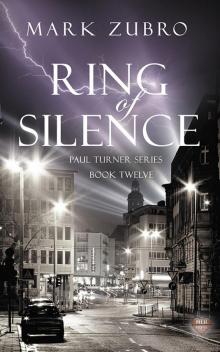 Ring of Silence
Ring of Silence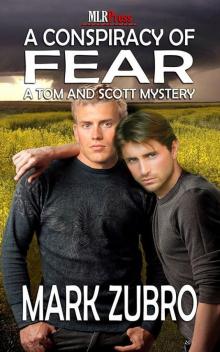 A Conspiracy of Fear
A Conspiracy of Fear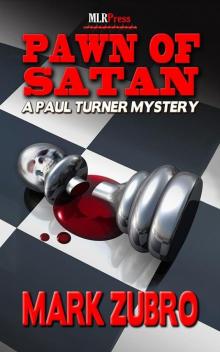 Pawn of Satan
Pawn of Satan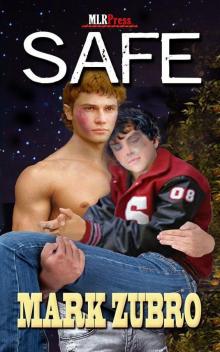 Safe
Safe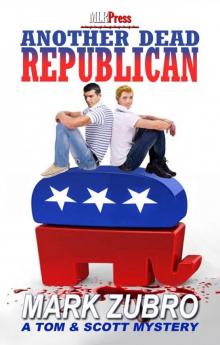 Another Dead Republican
Another Dead Republican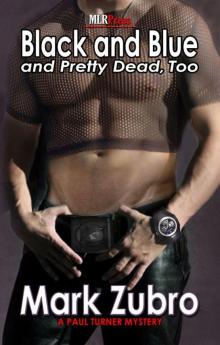 Black and Blue and Pretty Dead, Too
Black and Blue and Pretty Dead, Too Alien Home
Alien Home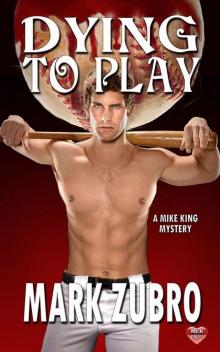 Dying to Play
Dying to Play Alien Victory
Alien Victory